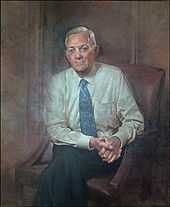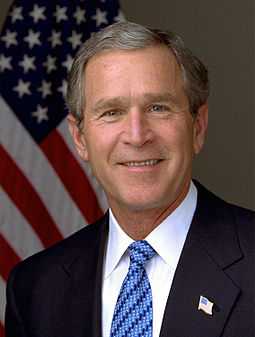Paul O'Neill (politician)
| Paul H. O'Neill | |
|---|---|
 | |
| 72nd United States Secretary of the Treasury | |
| In office January 20, 2001 – December 31, 2002 | |
| President | George W. Bush |
| Preceded by | Lawrence Summers |
| Succeeded by | John W. Snow |
| Personal details | |
| Born | Paul Henry O'Neill December 4, 1935 St. Louis, Missouri |
| Political party | Republican |
| Spouse(s) | Nancy O'Neill |
| Alma mater | California State University-Fresno Claremont Graduate University Indiana University, Bloomington |
| Religion | Methodist |
| Signature | |
Paul Henry O'Neill (born December 4, 1935) served as the 72nd United States Secretary of the Treasury for part of President George W. Bush's first term. He was fired in December 2002 for his public disagreement with the administration.[1] Prior to his term as Secretary of the Treasury, O'Neill was chairman and CEO of Pittsburgh-based industrial giant Alcoa and chairman of the RAND Corporation.
History
Early history
O'Neill was born in St. Louis, Missouri and currently resides in Pittsburgh. He met his wife at Anchorage High School in Anchorage, Alaska, from which they both graduated in 1954. He lived on the military base there with his parents. He received a bachelor's degree in Economics from California State University, Fresno, studied economics at Claremont Graduate University in 1961, and received a Master of Public Administration from Indiana University. O'Neill and his wife Nancy have four children, 12 grandchildren, and nine great grandchildren.
He began his public service as a computer systems analyst with the Veterans Administration, where he served from 1961 to 1966. He joined the United States Office of Management and Budget in 1967, and was deputy director of OMB from 1974 to 1977.
Private sector
After President Gerald Ford lost the 1976 election, O'Neill took an executive job at International Paper in New York City. He was vice president of the company from 1977 to 1985 and president from 1985 to 1987.
In 1989, he was approached by President George H. W. Bush to be Secretary of Defense. O'Neill declined, but recommended Dick Cheney for the position. Bush then pursued O'Neill to chair an advisory group on education that included Lamar Alexander, Bill Brock, and Richard Riley.
O'Neill was chairman and CEO of the Pittsburgh industrial giant Alcoa from 1987 to 1999, and retired as chairman at the end of 2000. The company's market value increased from $3 billion in 1986 to $27.53 billion in 2000, while net income increased from $200 million to $1.484 billion.
In 1995, O'Neill was made chairman of the RAND Corporation.
Community service career
In December 1997, O'Neill together with Karen Wolk Feinstein, President of the Jewish Healthcare Foundation, founded the Pittsburgh Regional Health Initiative (PRHI).[2] They assembled a wide-ranging coalition of healthcare interests to begin to address the problems of healthcare, as a region. PRHI adapted the principles of the Toyota Production System into the "Perfecting Patient Care" system.[3] Mr. O'Neill became a leader locally and nationally in addressing issues of patient safety and quality in healthcare.[4]
O'Neill was also co-leader of Pittsburgh's Riverlife Task Force, along with the editor of the Pittsburgh Post-Gazette at the time, John G. Craig Jr.
O'Neill is also a member of Carnegie Mellon University's Heinz College's Dean's Advisory Council.[5]
Bush Administration

O'Neill was appointed Secretary of the Treasury by George W. Bush. O'Neill often said things to the press that went against the administration's party line.
A report commissioned in 2002 by O'Neill, while he was Treasury Secretary, suggested the United States faced future federal budget deficits of more than US$ 500 billion. The report also suggested that sharp tax increases, massive spending cuts, or both would be unavoidable if the United States were to meet benefit promises to its future generations.
Ron Suskind interviewed O'Neill extensively about his tenure in the Bush Administration. He was also given access to a large amount of documentation. In 2004 he produced the book The Price of Loyalty, detailing O'Neill's tenure in the Bush Administration.[6] The book describes many of the conflicts that O'Neill had with the Bush administration. The book also details O'Neill's criticisms of some of Bush's economic policies. O'Neill claims that Bush appeared somewhat unquestioning and uncurious, and that the war in Iraq was planned from the first National Security Council meeting, soon after the administration took office. At the first cabinet meeting of the new Bush administration, O'Neill observed that the debate was not "should we attack Iraq?" but rather "how do we go about attacking Iraq?" O'Neill viewed this as a violation of earlier guarantees that (then-presidential candidate) Bush would refrain from nation building endeavors during his time in office.[7][8]
Comments and views
In a July 25, 2001 International Herald Tribune article, he shared a comment on the theory of an inevitable financial "contagion" in global financial markets and the theory that investors at the time would retreat from emerging markets because of their worries that the financial crises in Argentina and Turkey may spread to Brazil and elsewhere. He felt that this theory was not sound.
In an October 16, 2007 Op Ed published in the New York Times, he wrote of the reluctance among politicians to address comprehensive reform in the U.S. health care system. In the opinion, he suggested that doctors and hospitals should be required to report medical errors within 24 hours, as well as moving malpractice suits out of the civil courts and into a new, independent body. He also felt that health care reform had to acknowledge all aspects of the problem, such as insurance coverage, medical costs, quality of care, and information technology.[9]
References
- ↑ Bush Sought ‘Way’ To Invade Iraq? Rebecca Leung, 60 Minutes, January 11, 2004
- ↑ "Pittsburgh Regional Health Initiative". Prhi.org. Retrieved 2011-12-07.
- ↑
- ↑ http://www.modernhealthcare.com/page.cms?pageId=1063
- ↑ "The Heinz School - 2008 Alumni Reunion". Heinz.cmu.edu. 2008-09-05. Retrieved 2011-12-07.
- ↑ The Price of Loyalty: George W. Bush, the White House, and the Education of Paul O'Neill (ISBN 0-7432-5545-3) 2004
- ↑ Ron Suskind, George W. Bush and the Aug. 6, 2001, PDB Alex Koppelman, Salon, June 20, 2006
- ↑ Bush decided to remove Saddam 'on day one' Julian Borger, The Guardian, January 12, 2004
- ↑ O'Neill, Paul (October 16, 2007). "OP-ED CONTRIBUTOR; A Health Care Bargain". The New York Times.
| Political offices | ||
|---|---|---|
| Preceded by Lawrence Summers |
U.S. Secretary of the Treasury Served under: George W. Bush 2001–2002 |
Succeeded by John W. Snow |
| ||||||||
|

